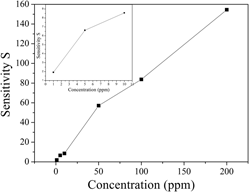Crossref Citations
This article has been cited by the following publications. This list is generated based on data provided by
Crossref.
Liu, Jinyun
Han, Tianli
Sun, Bai
Kong, Lingtao
Jin, Zhen
Huang, Xingjiu
Liu, Jinhuai
and
Meng, Fanli
2016.
Catalysis-Based Cataluminescent and Conductometric Gas Sensors: Sensing Nanomaterials, Mechanism, Applications and Perspectives.
Catalysts,
Vol. 6,
Issue. 12,
p.
210.
Shi, Guolong
He, Yigang
Luo, Qiwu
Li, Bing
and
Zhang, Chaolong
2018.
Portable device for acetone detection based on cataluminescence sensor utilizing wireless communication technique.
Sensors and Actuators B: Chemical,
Vol. 257,
Issue. ,
p.
451.
Zhang, Peng
Dong, Zhiyuan
Ran, Yuanming
Xie, Hualin
Lu, Yun
and
Ding, Shimin
2018.
Preparation and photocatalytic application of AgBr modified Bi2WO6 nanosheets with high adsorption capacity.
Journal of Materials Research,
Vol. 33,
Issue. 23,
p.
3953.
Gui, Yang-hai
Wang, Hai-yan
Tian, Kuan
Yang, Le-le
Guo, Hui-shi
Zhang, Hong-zhong
Fang, Shao-ming
and
Wang, Yun
2018.
Enhanced gas sensing properties to NO2 of SnO2/rGO nanocomposites synthesized by microwave-assisted gas-liquid interfacial method.
Ceramics International,
Vol. 44,
Issue. 5,
p.
4900.
Huang, Shanshan
Song, Jian
and
Huang, Kaijin
2019.
Ethylamine gas sensing properties of SnO2/rGO nanocomposite materials.
IOP Conference Series: Materials Science and Engineering,
Vol. 612,
Issue. 2,
p.
022104.
Jiang, Rui
Jia, Lihua
Guo, Xiangfeng
Zhao, Zhenlong
Du, Jinping
Wang, Xin
Wang, Ping
and
Xing, Fenglan
2019.
Dimethyl sulfoxide-assisted hydrothermal synthesis of Co3O4-based nanorods for selective and sensitive diethyl ether sensing.
Sensors and Actuators B: Chemical,
Vol. 290,
Issue. ,
p.
275.
Chu, Jifeng
Wang, Qiongyuan
Yang, Aijun
Pan, Jianbin
Yuan, Huan
Wang, Xiaohua
and
Rong, Mingzhe
2022.
MOF-doped WO3 nanofibers for the SF6 decomposition products: The effects of MOF-modification on the sensitive performance and mechanism.
Applied Surface Science,
Vol. 606,
Issue. ,
p.
154889.
Gong, Wufei
Yao, Shenman
Liang, Yan
Chen, Bin
Yang, Yanxing
Luo, Xingfang
Yu, Ting
Yuan, Cailei
and
Yang, Yong
2023.
In-situ construction of direct Z-scheme NiO/Bi2MoO6 heterostructure arrays with enhanced room temperature ether sensing properties under visible light irradiation.
Journal of Hazardous Materials,
Vol. 458,
Issue. ,
p.
131936.
Chu, Jifeng
Pan, Jianbin
Wang, Qiongyuan
Yang, Aijun
Song, Shizhen
Yuan, Huan
Rong, Mingzhe
and
Wang, Xiaohua
2023.
Research progress and prospects on gas-sensitive mechanisms of semiconductor sensors.
Physical Chemistry Chemical Physics,
Vol. 25,
Issue. 18,
p.
12668.
Wang, Guanwen
Mu, Baoyi
Cao, Ke
Chi, Chunlei
Wang, Chuanqing
Huangfu, Chao
Feng, Fan
Qi, Bin
Miao, Qiushi
Yang, Xinhou
Liu, Zheng
Wei, Tong
and
Fan, Zhuangjun
2025.
Polymer-derived C-Sn/SnO2@rGO heterostructures with dual assistance of gallic acid for high-performance lithium-ion batteries.
Chemical Engineering Journal,
Vol. 512,
Issue. ,
p.
162423.

 $\left( {{\rm{C}}{{\rm{H}}_{\rm{3}}}\mathop {{\rm{C}}{{\rm{H}}_{\rm{2}}}}\nolimits^ \cdot } \right)$, oxethyl
$\left( {{\rm{C}}{{\rm{H}}_{\rm{3}}}\mathop {{\rm{C}}{{\rm{H}}_{\rm{2}}}}\nolimits^ \cdot } \right)$, oxethyl  $\left( {{\rm{C}}{{\rm{H}}_{\rm{3}}}{\rm{C}}{{\rm{H}}_2}{{\rm{O}}^ \cdot }} \right)$, ethanol (CH3CH2OH), formaldehyde (HCHO), acetaldehyde (CH3CHO), ethylene (C2H4), H2O, and CO2 surface species are formed during diethyl ether adsorption at different temperatures. A possible mechanism of the reaction process is discussed.
$\left( {{\rm{C}}{{\rm{H}}_{\rm{3}}}{\rm{C}}{{\rm{H}}_2}{{\rm{O}}^ \cdot }} \right)$, ethanol (CH3CH2OH), formaldehyde (HCHO), acetaldehyde (CH3CHO), ethylene (C2H4), H2O, and CO2 surface species are formed during diethyl ether adsorption at different temperatures. A possible mechanism of the reaction process is discussed.